A Comprehensive Review of Management Accounting Research and Trends
VerifiedAdded on 2020/03/13
|7
|2471
|125
Report
AI Summary
This report delves into the core of management accounting, examining established knowledge, research themes, and future directions. It explores key topics such as budgets, cost accounting, and performance measurement, highlighting their significance in decision-making. The report discusses the evolution of management accounting research, including the role of management control systems, the importance of replications, and common themes like budgeting and performance incentives. It also touches on the impact of behavioral economics and competitive strategies on management accounting practices. The report emphasizes the need for reliable and valid research, especially through replication studies, to enhance the established knowledge in the field and the value of MA in planning and control.
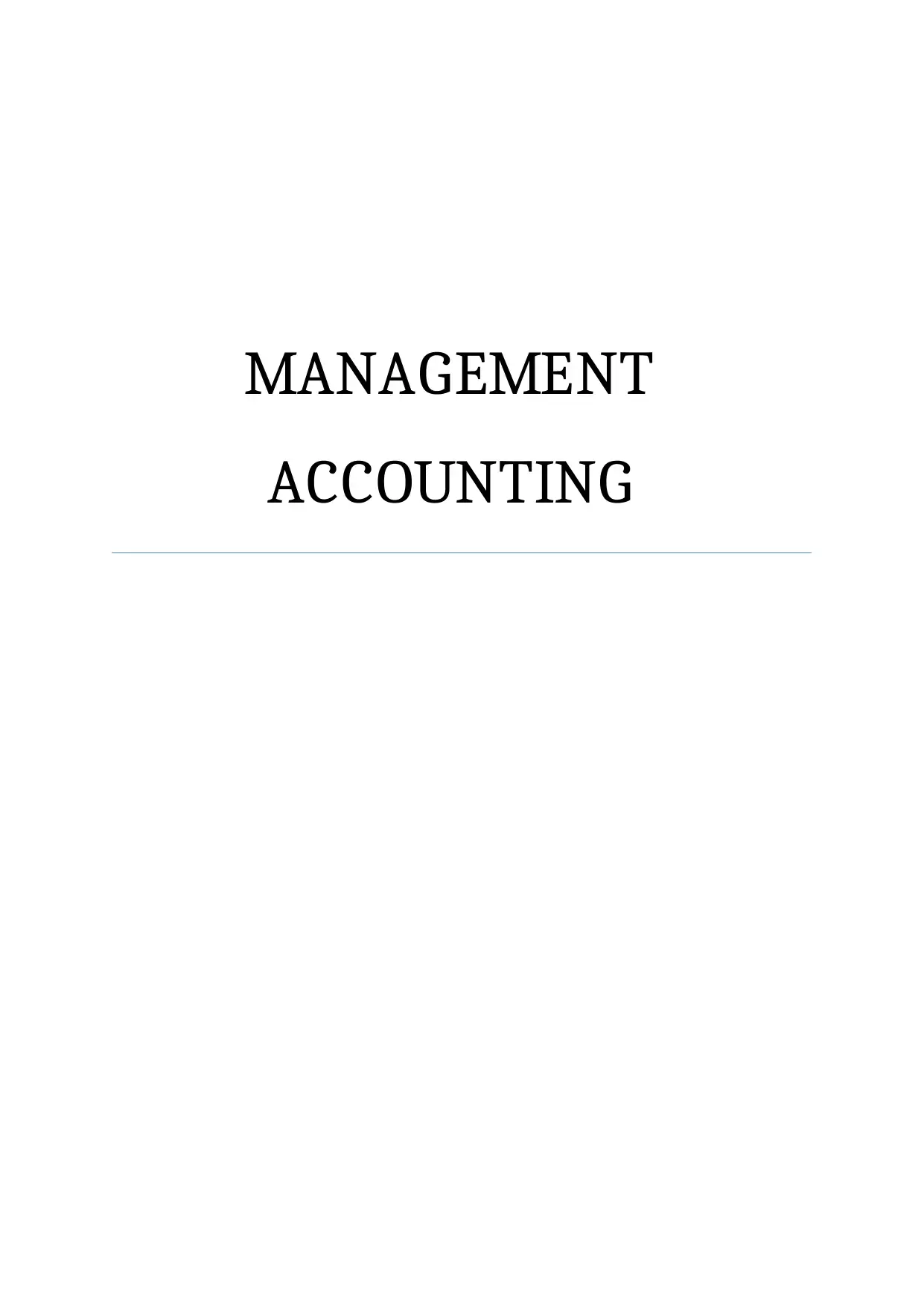
MANAGEMENT
ACCOUNTING
ACCOUNTING
Paraphrase This Document
Need a fresh take? Get an instant paraphrase of this document with our AI Paraphraser
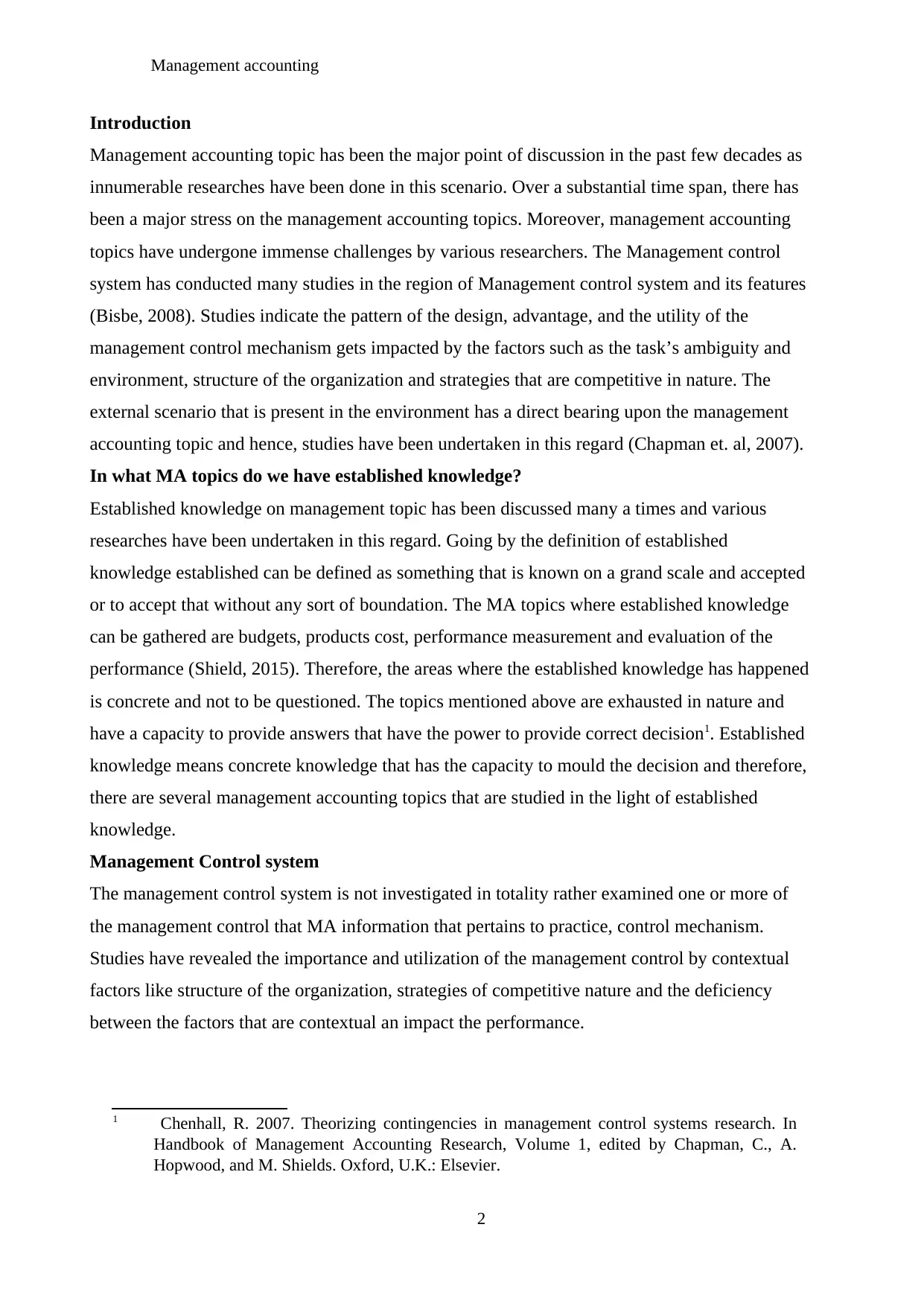
Management accounting
Introduction
Management accounting topic has been the major point of discussion in the past few decades as
innumerable researches have been done in this scenario. Over a substantial time span, there has
been a major stress on the management accounting topics. Moreover, management accounting
topics have undergone immense challenges by various researchers. The Management control
system has conducted many studies in the region of Management control system and its features
(Bisbe, 2008). Studies indicate the pattern of the design, advantage, and the utility of the
management control mechanism gets impacted by the factors such as the task’s ambiguity and
environment, structure of the organization and strategies that are competitive in nature. The
external scenario that is present in the environment has a direct bearing upon the management
accounting topic and hence, studies have been undertaken in this regard (Chapman et. al, 2007).
In what MA topics do we have established knowledge?
Established knowledge on management topic has been discussed many a times and various
researches have been undertaken in this regard. Going by the definition of established
knowledge established can be defined as something that is known on a grand scale and accepted
or to accept that without any sort of boundation. The MA topics where established knowledge
can be gathered are budgets, products cost, performance measurement and evaluation of the
performance (Shield, 2015). Therefore, the areas where the established knowledge has happened
is concrete and not to be questioned. The topics mentioned above are exhausted in nature and
have a capacity to provide answers that have the power to provide correct decision1. Established
knowledge means concrete knowledge that has the capacity to mould the decision and therefore,
there are several management accounting topics that are studied in the light of established
knowledge.
Management Control system
The management control system is not investigated in totality rather examined one or more of
the management control that MA information that pertains to practice, control mechanism.
Studies have revealed the importance and utilization of the management control by contextual
factors like structure of the organization, strategies of competitive nature and the deficiency
between the factors that are contextual an impact the performance.
1 Chenhall, R. 2007. Theorizing contingencies in management control systems research. In
Handbook of Management Accounting Research, Volume 1, edited by Chapman, C., A.
Hopwood, and M. Shields. Oxford, U.K.: Elsevier.
2
Introduction
Management accounting topic has been the major point of discussion in the past few decades as
innumerable researches have been done in this scenario. Over a substantial time span, there has
been a major stress on the management accounting topics. Moreover, management accounting
topics have undergone immense challenges by various researchers. The Management control
system has conducted many studies in the region of Management control system and its features
(Bisbe, 2008). Studies indicate the pattern of the design, advantage, and the utility of the
management control mechanism gets impacted by the factors such as the task’s ambiguity and
environment, structure of the organization and strategies that are competitive in nature. The
external scenario that is present in the environment has a direct bearing upon the management
accounting topic and hence, studies have been undertaken in this regard (Chapman et. al, 2007).
In what MA topics do we have established knowledge?
Established knowledge on management topic has been discussed many a times and various
researches have been undertaken in this regard. Going by the definition of established
knowledge established can be defined as something that is known on a grand scale and accepted
or to accept that without any sort of boundation. The MA topics where established knowledge
can be gathered are budgets, products cost, performance measurement and evaluation of the
performance (Shield, 2015). Therefore, the areas where the established knowledge has happened
is concrete and not to be questioned. The topics mentioned above are exhausted in nature and
have a capacity to provide answers that have the power to provide correct decision1. Established
knowledge means concrete knowledge that has the capacity to mould the decision and therefore,
there are several management accounting topics that are studied in the light of established
knowledge.
Management Control system
The management control system is not investigated in totality rather examined one or more of
the management control that MA information that pertains to practice, control mechanism.
Studies have revealed the importance and utilization of the management control by contextual
factors like structure of the organization, strategies of competitive nature and the deficiency
between the factors that are contextual an impact the performance.
1 Chenhall, R. 2007. Theorizing contingencies in management control systems research. In
Handbook of Management Accounting Research, Volume 1, edited by Chapman, C., A.
Hopwood, and M. Shields. Oxford, U.K.: Elsevier.
2
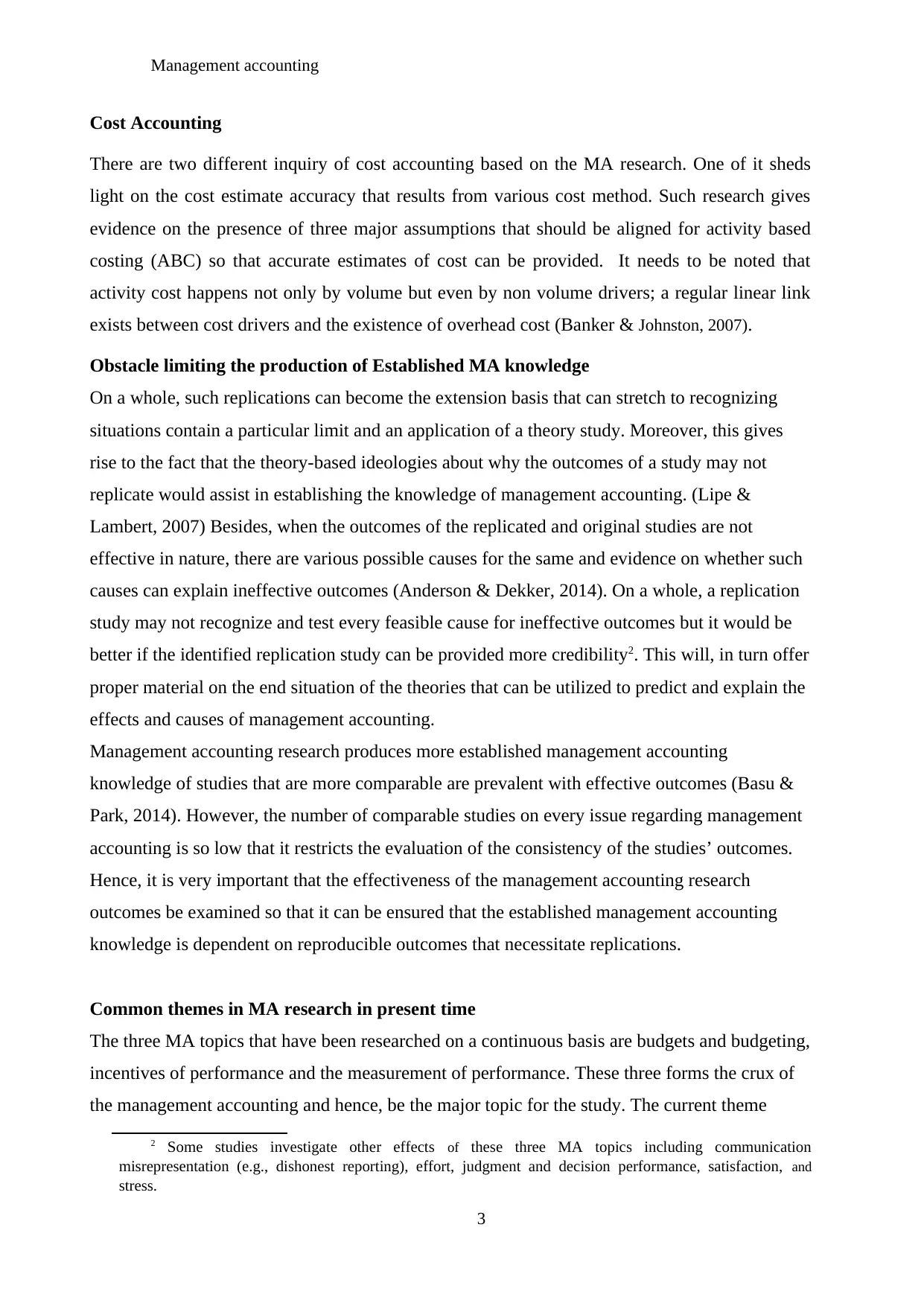
Management accounting
Cost Accounting
There are two different inquiry of cost accounting based on the MA research. One of it sheds
light on the cost estimate accuracy that results from various cost method. Such research gives
evidence on the presence of three major assumptions that should be aligned for activity based
costing (ABC) so that accurate estimates of cost can be provided. It needs to be noted that
activity cost happens not only by volume but even by non volume drivers; a regular linear link
exists between cost drivers and the existence of overhead cost (Banker & Johnston, 2007).
Obstacle limiting the production of Established MA knowledge
On a whole, such replications can become the extension basis that can stretch to recognizing
situations contain a particular limit and an application of a theory study. Moreover, this gives
rise to the fact that the theory-based ideologies about why the outcomes of a study may not
replicate would assist in establishing the knowledge of management accounting. (Lipe &
Lambert, 2007) Besides, when the outcomes of the replicated and original studies are not
effective in nature, there are various possible causes for the same and evidence on whether such
causes can explain ineffective outcomes (Anderson & Dekker, 2014). On a whole, a replication
study may not recognize and test every feasible cause for ineffective outcomes but it would be
better if the identified replication study can be provided more credibility2. This will, in turn offer
proper material on the end situation of the theories that can be utilized to predict and explain the
effects and causes of management accounting.
Management accounting research produces more established management accounting
knowledge of studies that are more comparable are prevalent with effective outcomes (Basu &
Park, 2014). However, the number of comparable studies on every issue regarding management
accounting is so low that it restricts the evaluation of the consistency of the studies’ outcomes.
Hence, it is very important that the effectiveness of the management accounting research
outcomes be examined so that it can be ensured that the established management accounting
knowledge is dependent on reproducible outcomes that necessitate replications.
Common themes in MA research in present time
The three MA topics that have been researched on a continuous basis are budgets and budgeting,
incentives of performance and the measurement of performance. These three forms the crux of
the management accounting and hence, be the major topic for the study. The current theme
2 Some studies investigate other effects of these three MA topics including communication
misrepresentation (e.g., dishonest reporting), effort, judgment and decision performance, satisfaction, and
stress.
3
Cost Accounting
There are two different inquiry of cost accounting based on the MA research. One of it sheds
light on the cost estimate accuracy that results from various cost method. Such research gives
evidence on the presence of three major assumptions that should be aligned for activity based
costing (ABC) so that accurate estimates of cost can be provided. It needs to be noted that
activity cost happens not only by volume but even by non volume drivers; a regular linear link
exists between cost drivers and the existence of overhead cost (Banker & Johnston, 2007).
Obstacle limiting the production of Established MA knowledge
On a whole, such replications can become the extension basis that can stretch to recognizing
situations contain a particular limit and an application of a theory study. Moreover, this gives
rise to the fact that the theory-based ideologies about why the outcomes of a study may not
replicate would assist in establishing the knowledge of management accounting. (Lipe &
Lambert, 2007) Besides, when the outcomes of the replicated and original studies are not
effective in nature, there are various possible causes for the same and evidence on whether such
causes can explain ineffective outcomes (Anderson & Dekker, 2014). On a whole, a replication
study may not recognize and test every feasible cause for ineffective outcomes but it would be
better if the identified replication study can be provided more credibility2. This will, in turn offer
proper material on the end situation of the theories that can be utilized to predict and explain the
effects and causes of management accounting.
Management accounting research produces more established management accounting
knowledge of studies that are more comparable are prevalent with effective outcomes (Basu &
Park, 2014). However, the number of comparable studies on every issue regarding management
accounting is so low that it restricts the evaluation of the consistency of the studies’ outcomes.
Hence, it is very important that the effectiveness of the management accounting research
outcomes be examined so that it can be ensured that the established management accounting
knowledge is dependent on reproducible outcomes that necessitate replications.
Common themes in MA research in present time
The three MA topics that have been researched on a continuous basis are budgets and budgeting,
incentives of performance and the measurement of performance. These three forms the crux of
the management accounting and hence, be the major topic for the study. The current theme
2 Some studies investigate other effects of these three MA topics including communication
misrepresentation (e.g., dishonest reporting), effort, judgment and decision performance, satisfaction, and
stress.
3
⊘ This is a preview!⊘
Do you want full access?
Subscribe today to unlock all pages.

Trusted by 1+ million students worldwide
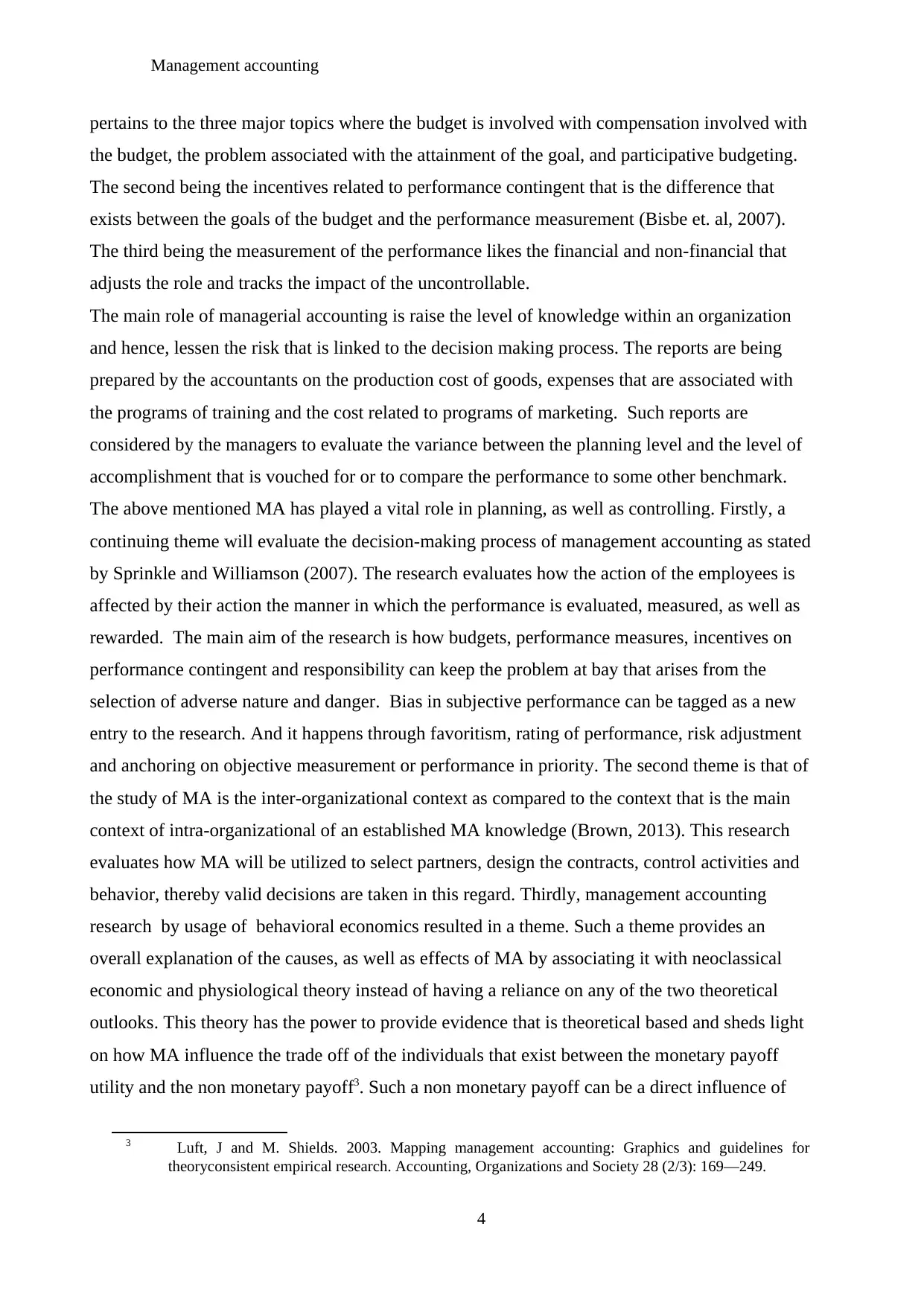
Management accounting
pertains to the three major topics where the budget is involved with compensation involved with
the budget, the problem associated with the attainment of the goal, and participative budgeting.
The second being the incentives related to performance contingent that is the difference that
exists between the goals of the budget and the performance measurement (Bisbe et. al, 2007).
The third being the measurement of the performance likes the financial and non-financial that
adjusts the role and tracks the impact of the uncontrollable.
The main role of managerial accounting is raise the level of knowledge within an organization
and hence, lessen the risk that is linked to the decision making process. The reports are being
prepared by the accountants on the production cost of goods, expenses that are associated with
the programs of training and the cost related to programs of marketing. Such reports are
considered by the managers to evaluate the variance between the planning level and the level of
accomplishment that is vouched for or to compare the performance to some other benchmark.
The above mentioned MA has played a vital role in planning, as well as controlling. Firstly, a
continuing theme will evaluate the decision-making process of management accounting as stated
by Sprinkle and Williamson (2007). The research evaluates how the action of the employees is
affected by their action the manner in which the performance is evaluated, measured, as well as
rewarded. The main aim of the research is how budgets, performance measures, incentives on
performance contingent and responsibility can keep the problem at bay that arises from the
selection of adverse nature and danger. Bias in subjective performance can be tagged as a new
entry to the research. And it happens through favoritism, rating of performance, risk adjustment
and anchoring on objective measurement or performance in priority. The second theme is that of
the study of MA is the inter-organizational context as compared to the context that is the main
context of intra-organizational of an established MA knowledge (Brown, 2013). This research
evaluates how MA will be utilized to select partners, design the contracts, control activities and
behavior, thereby valid decisions are taken in this regard. Thirdly, management accounting
research by usage of behavioral economics resulted in a theme. Such a theme provides an
overall explanation of the causes, as well as effects of MA by associating it with neoclassical
economic and physiological theory instead of having a reliance on any of the two theoretical
outlooks. This theory has the power to provide evidence that is theoretical based and sheds light
on how MA influence the trade off of the individuals that exist between the monetary payoff
utility and the non monetary payoff3. Such a non monetary payoff can be a direct influence of
3 Luft, J and M. Shields. 2003. Mapping management accounting: Graphics and guidelines for
theoryconsistent empirical research. Accounting, Organizations and Society 28 (2/3): 169—249.
4
pertains to the three major topics where the budget is involved with compensation involved with
the budget, the problem associated with the attainment of the goal, and participative budgeting.
The second being the incentives related to performance contingent that is the difference that
exists between the goals of the budget and the performance measurement (Bisbe et. al, 2007).
The third being the measurement of the performance likes the financial and non-financial that
adjusts the role and tracks the impact of the uncontrollable.
The main role of managerial accounting is raise the level of knowledge within an organization
and hence, lessen the risk that is linked to the decision making process. The reports are being
prepared by the accountants on the production cost of goods, expenses that are associated with
the programs of training and the cost related to programs of marketing. Such reports are
considered by the managers to evaluate the variance between the planning level and the level of
accomplishment that is vouched for or to compare the performance to some other benchmark.
The above mentioned MA has played a vital role in planning, as well as controlling. Firstly, a
continuing theme will evaluate the decision-making process of management accounting as stated
by Sprinkle and Williamson (2007). The research evaluates how the action of the employees is
affected by their action the manner in which the performance is evaluated, measured, as well as
rewarded. The main aim of the research is how budgets, performance measures, incentives on
performance contingent and responsibility can keep the problem at bay that arises from the
selection of adverse nature and danger. Bias in subjective performance can be tagged as a new
entry to the research. And it happens through favoritism, rating of performance, risk adjustment
and anchoring on objective measurement or performance in priority. The second theme is that of
the study of MA is the inter-organizational context as compared to the context that is the main
context of intra-organizational of an established MA knowledge (Brown, 2013). This research
evaluates how MA will be utilized to select partners, design the contracts, control activities and
behavior, thereby valid decisions are taken in this regard. Thirdly, management accounting
research by usage of behavioral economics resulted in a theme. Such a theme provides an
overall explanation of the causes, as well as effects of MA by associating it with neoclassical
economic and physiological theory instead of having a reliance on any of the two theoretical
outlooks. This theory has the power to provide evidence that is theoretical based and sheds light
on how MA influence the trade off of the individuals that exist between the monetary payoff
utility and the non monetary payoff3. Such a non monetary payoff can be a direct influence of
3 Luft, J and M. Shields. 2003. Mapping management accounting: Graphics and guidelines for
theoryconsistent empirical research. Accounting, Organizations and Society 28 (2/3): 169—249.
4
Paraphrase This Document
Need a fresh take? Get an instant paraphrase of this document with our AI Paraphraser
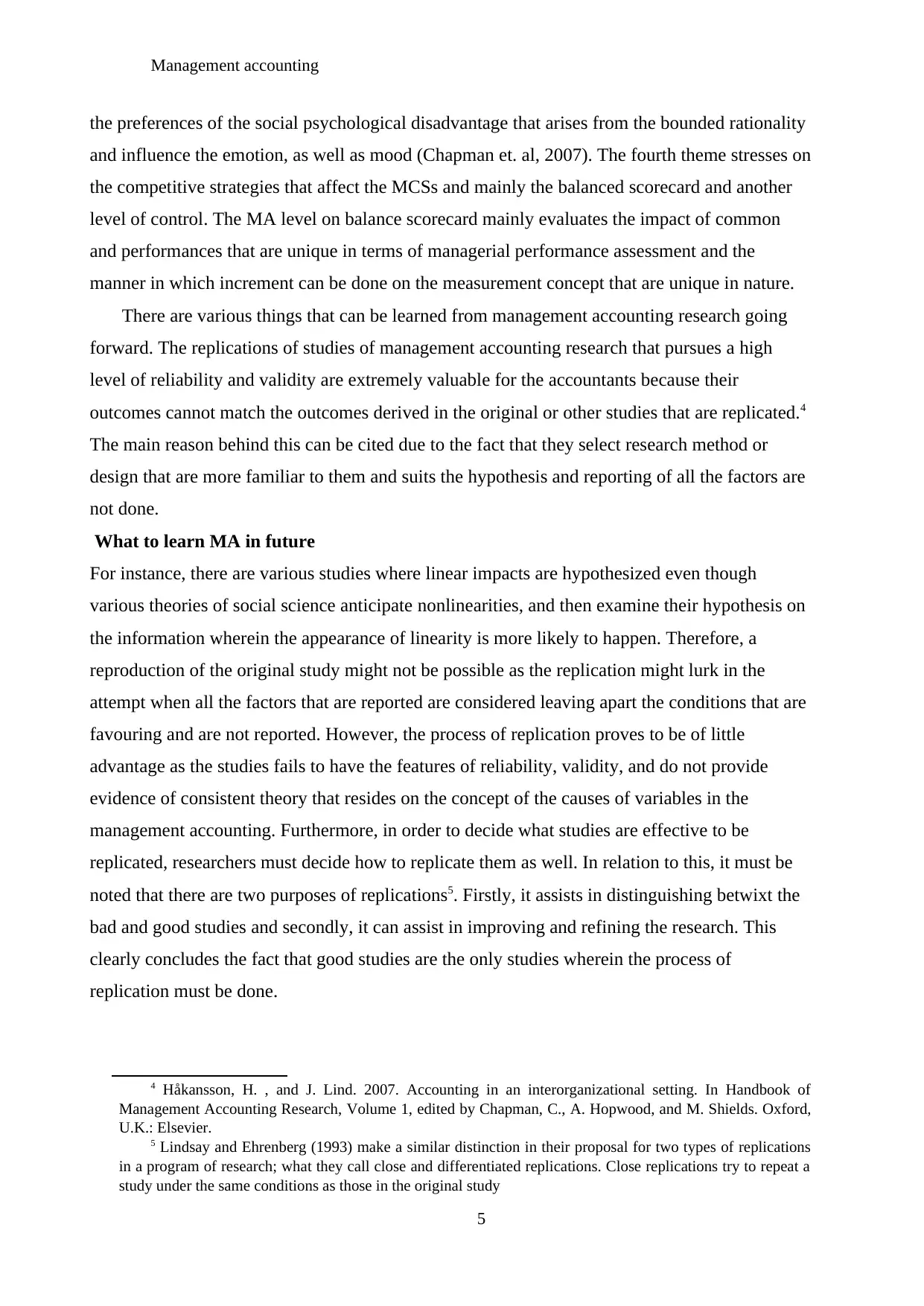
Management accounting
the preferences of the social psychological disadvantage that arises from the bounded rationality
and influence the emotion, as well as mood (Chapman et. al, 2007). The fourth theme stresses on
the competitive strategies that affect the MCSs and mainly the balanced scorecard and another
level of control. The MA level on balance scorecard mainly evaluates the impact of common
and performances that are unique in terms of managerial performance assessment and the
manner in which increment can be done on the measurement concept that are unique in nature.
There are various things that can be learned from management accounting research going
forward. The replications of studies of management accounting research that pursues a high
level of reliability and validity are extremely valuable for the accountants because their
outcomes cannot match the outcomes derived in the original or other studies that are replicated.4
The main reason behind this can be cited due to the fact that they select research method or
design that are more familiar to them and suits the hypothesis and reporting of all the factors are
not done.
What to learn MA in future
For instance, there are various studies where linear impacts are hypothesized even though
various theories of social science anticipate nonlinearities, and then examine their hypothesis on
the information wherein the appearance of linearity is more likely to happen. Therefore, a
reproduction of the original study might not be possible as the replication might lurk in the
attempt when all the factors that are reported are considered leaving apart the conditions that are
favouring and are not reported. However, the process of replication proves to be of little
advantage as the studies fails to have the features of reliability, validity, and do not provide
evidence of consistent theory that resides on the concept of the causes of variables in the
management accounting. Furthermore, in order to decide what studies are effective to be
replicated, researchers must decide how to replicate them as well. In relation to this, it must be
noted that there are two purposes of replications5. Firstly, it assists in distinguishing betwixt the
bad and good studies and secondly, it can assist in improving and refining the research. This
clearly concludes the fact that good studies are the only studies wherein the process of
replication must be done.
4 Håkansson, H. , and J. Lind. 2007. Accounting in an interorganizational setting. In Handbook of
Management Accounting Research, Volume 1, edited by Chapman, C., A. Hopwood, and M. Shields. Oxford,
U.K.: Elsevier.
5 Lindsay and Ehrenberg (1993) make a similar distinction in their proposal for two types of replications
in a program of research; what they call close and differentiated replications. Close replications try to repeat a
study under the same conditions as those in the original study
5
the preferences of the social psychological disadvantage that arises from the bounded rationality
and influence the emotion, as well as mood (Chapman et. al, 2007). The fourth theme stresses on
the competitive strategies that affect the MCSs and mainly the balanced scorecard and another
level of control. The MA level on balance scorecard mainly evaluates the impact of common
and performances that are unique in terms of managerial performance assessment and the
manner in which increment can be done on the measurement concept that are unique in nature.
There are various things that can be learned from management accounting research going
forward. The replications of studies of management accounting research that pursues a high
level of reliability and validity are extremely valuable for the accountants because their
outcomes cannot match the outcomes derived in the original or other studies that are replicated.4
The main reason behind this can be cited due to the fact that they select research method or
design that are more familiar to them and suits the hypothesis and reporting of all the factors are
not done.
What to learn MA in future
For instance, there are various studies where linear impacts are hypothesized even though
various theories of social science anticipate nonlinearities, and then examine their hypothesis on
the information wherein the appearance of linearity is more likely to happen. Therefore, a
reproduction of the original study might not be possible as the replication might lurk in the
attempt when all the factors that are reported are considered leaving apart the conditions that are
favouring and are not reported. However, the process of replication proves to be of little
advantage as the studies fails to have the features of reliability, validity, and do not provide
evidence of consistent theory that resides on the concept of the causes of variables in the
management accounting. Furthermore, in order to decide what studies are effective to be
replicated, researchers must decide how to replicate them as well. In relation to this, it must be
noted that there are two purposes of replications5. Firstly, it assists in distinguishing betwixt the
bad and good studies and secondly, it can assist in improving and refining the research. This
clearly concludes the fact that good studies are the only studies wherein the process of
replication must be done.
4 Håkansson, H. , and J. Lind. 2007. Accounting in an interorganizational setting. In Handbook of
Management Accounting Research, Volume 1, edited by Chapman, C., A. Hopwood, and M. Shields. Oxford,
U.K.: Elsevier.
5 Lindsay and Ehrenberg (1993) make a similar distinction in their proposal for two types of replications
in a program of research; what they call close and differentiated replications. Close replications try to repeat a
study under the same conditions as those in the original study
5
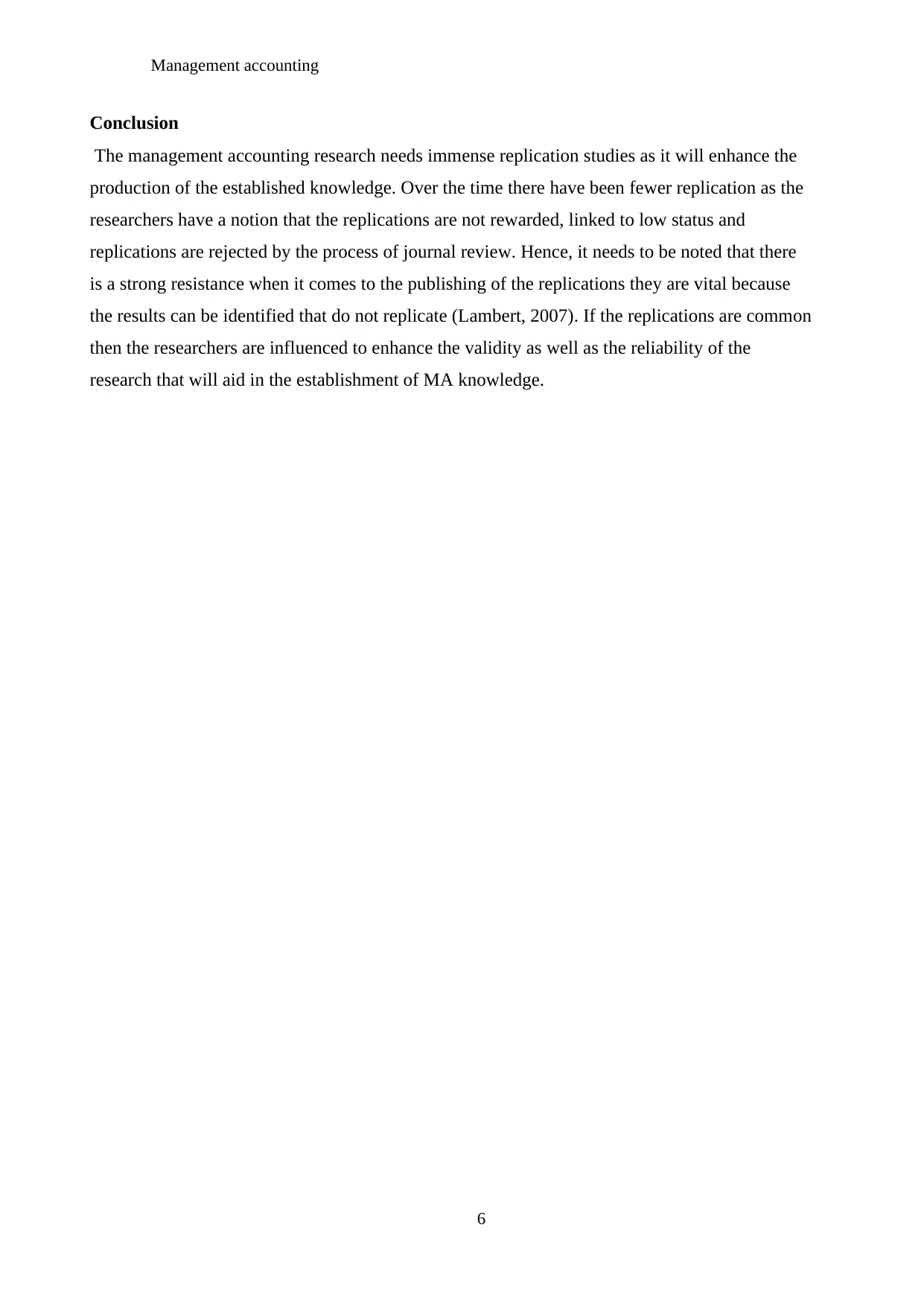
Management accounting
Conclusion
The management accounting research needs immense replication studies as it will enhance the
production of the established knowledge. Over the time there have been fewer replication as the
researchers have a notion that the replications are not rewarded, linked to low status and
replications are rejected by the process of journal review. Hence, it needs to be noted that there
is a strong resistance when it comes to the publishing of the replications they are vital because
the results can be identified that do not replicate (Lambert, 2007). If the replications are common
then the researchers are influenced to enhance the validity as well as the reliability of the
research that will aid in the establishment of MA knowledge.
6
Conclusion
The management accounting research needs immense replication studies as it will enhance the
production of the established knowledge. Over the time there have been fewer replication as the
researchers have a notion that the replications are not rewarded, linked to low status and
replications are rejected by the process of journal review. Hence, it needs to be noted that there
is a strong resistance when it comes to the publishing of the replications they are vital because
the results can be identified that do not replicate (Lambert, 2007). If the replications are common
then the researchers are influenced to enhance the validity as well as the reliability of the
research that will aid in the establishment of MA knowledge.
6
⊘ This is a preview!⊘
Do you want full access?
Subscribe today to unlock all pages.

Trusted by 1+ million students worldwide
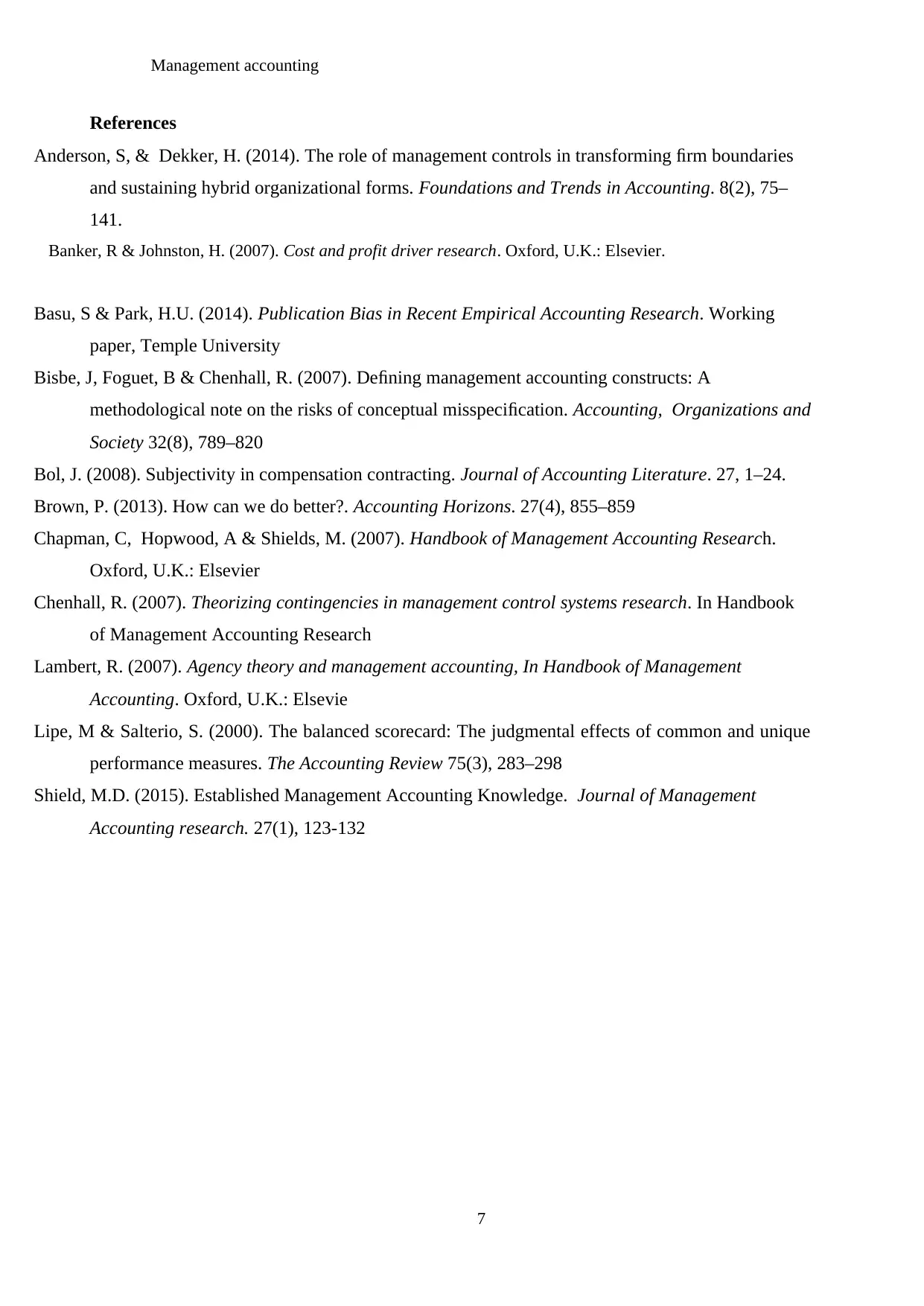
Management accounting
References
Anderson, S, & Dekker, H. (2014). The role of management controls in transforming firm boundaries
and sustaining hybrid organizational forms. Foundations and Trends in Accounting. 8(2), 75–
141.
Banker, R & Johnston, H. (2007). Cost and profit driver research. Oxford, U.K.: Elsevier.
Basu, S & Park, H.U. (2014). Publication Bias in Recent Empirical Accounting Research. Working
paper, Temple University
Bisbe, J, Foguet, B & Chenhall, R. (2007). Defining management accounting constructs: A
methodological note on the risks of conceptual misspecification. Accounting, Organizations and
Society 32(8), 789–820
Bol, J. (2008). Subjectivity in compensation contracting. Journal of Accounting Literature. 27, 1–24.
Brown, P. (2013). How can we do better?. Accounting Horizons. 27(4), 855–859
Chapman, C, Hopwood, A & Shields, M. (2007). Handbook of Management Accounting Research.
Oxford, U.K.: Elsevier
Chenhall, R. (2007). Theorizing contingencies in management control systems research. In Handbook
of Management Accounting Research
Lambert, R. (2007). Agency theory and management accounting, In Handbook of Management
Accounting. Oxford, U.K.: Elsevie
Lipe, M & Salterio, S. (2000). The balanced scorecard: The judgmental effects of common and unique
performance measures. The Accounting Review 75(3), 283–298
Shield, M.D. (2015). Established Management Accounting Knowledge. Journal of Management
Accounting research. 27(1), 123-132
7
References
Anderson, S, & Dekker, H. (2014). The role of management controls in transforming firm boundaries
and sustaining hybrid organizational forms. Foundations and Trends in Accounting. 8(2), 75–
141.
Banker, R & Johnston, H. (2007). Cost and profit driver research. Oxford, U.K.: Elsevier.
Basu, S & Park, H.U. (2014). Publication Bias in Recent Empirical Accounting Research. Working
paper, Temple University
Bisbe, J, Foguet, B & Chenhall, R. (2007). Defining management accounting constructs: A
methodological note on the risks of conceptual misspecification. Accounting, Organizations and
Society 32(8), 789–820
Bol, J. (2008). Subjectivity in compensation contracting. Journal of Accounting Literature. 27, 1–24.
Brown, P. (2013). How can we do better?. Accounting Horizons. 27(4), 855–859
Chapman, C, Hopwood, A & Shields, M. (2007). Handbook of Management Accounting Research.
Oxford, U.K.: Elsevier
Chenhall, R. (2007). Theorizing contingencies in management control systems research. In Handbook
of Management Accounting Research
Lambert, R. (2007). Agency theory and management accounting, In Handbook of Management
Accounting. Oxford, U.K.: Elsevie
Lipe, M & Salterio, S. (2000). The balanced scorecard: The judgmental effects of common and unique
performance measures. The Accounting Review 75(3), 283–298
Shield, M.D. (2015). Established Management Accounting Knowledge. Journal of Management
Accounting research. 27(1), 123-132
7
1 out of 7
Related Documents
Your All-in-One AI-Powered Toolkit for Academic Success.
+13062052269
info@desklib.com
Available 24*7 on WhatsApp / Email
![[object Object]](/_next/static/media/star-bottom.7253800d.svg)
Unlock your academic potential
Copyright © 2020–2026 A2Z Services. All Rights Reserved. Developed and managed by ZUCOL.





